President Paul Kagame has cautioned that if Africa fails to bridge existing gaps in digital connectivity and technological advancement, inequality between the continent and the rest of the world will continue to widen.
He made the remarks on October 21, 2025, while officially opening the Mobile World Congress (MWC) Africa, a three-day global technology conference taking place in Kigali. The event is organized by the Global System for Mobile Communications Association (GSMA), which promotes the growth of mobile technology and innovation worldwide.
President Kagame reaffirmed Rwanda’s strong belief in the power of technology to connect people and drive sustainable development.
He reminded attendees how far Africa has come in improving connectivity, noting that the continent has transitioned from isolation to becoming an active player in building economies powered by mobile phones.
“Broadband connectivity and smartphones have become essential parts of everyday life, driving commerce, education, and financial inclusion across different sectors. Mobile Money is a great example,” said President Kagame.
He highlighted that Mobile Money has contributed over $1 trillion to Africa’s economy in the past decade, with more than 700 million people now accessing mobile-based financial services. What began as a solution for those excluded from traditional banking, he said, has evolved into a mainstream tool driving global financial inclusion.
The Head of State emphasized that these digital solutions have empowered small businesses, entrepreneurs—especially women—and rural communities, helping to stimulate inclusive economic growth.
“These initiatives demonstrate that innovation is not limited to one area—it can spread everywhere, giving everyone a fair chance,” Kagame said.
He further noted that today’s technological progress, including artificial intelligence (AI), the Internet of Things (IoT), and advanced connectivity, is transforming industries and creating new opportunities across the world.
“However, despite the progress, only a small fraction of Africans are connected compared to other regions. If this gap continues to grow, technology will only deepen inequalities,” warned President Kagame.
He called for stronger efforts to make digital knowledge accessible to all and to ensure that no citizen is left behind. Rwanda, he said, is already advancing toward a knowledge-based economy through various initiatives such as integrating AI in planning, promoting research, and building citizens’ technological capacities to improve productivity and service delivery.
“While Africa faces challenges, they also come with opportunities for development—if we work together. Governments, private sector players, and development partners must promote policies and environments that encourage innovation,” he added.
Kagame stated that fostering such collaboration will enhance cross-border data exchange and secure digital payments, ultimately linking African economies more closely.
He commended the African Union and other organizations for pushing this agenda by working to lower costs, remove barriers, and create a unified digital market that can take African innovations global.
Rwanda’s Digital Transformation Highlighted
Minister of ICT and Innovation, Paula Ingabire, praised Rwanda for hosting the MWC again, recalling that in 2022, it was the first African country to host a GSMA congress.
She revealed that the number of Rwandans using 4G internet increased tenfold from 500,000 in 2023 to five million by June 2025, thanks to strategic partnerships and pro-innovation government policies.
“In that spirit, MTN Rwanda launched its 5G network, and the Government of Rwanda secured 60-gigabyte broadband capacity to ensure that every household, school, and hospital can access high-speed internet,” Ingabire said.
She also mentioned that over 1,000 health facilities and 4,000 schools are now connected to fast internet, while 4.5 million citizens have been trained in digital literacy through the Digital Ambassadors Program.
Additionally, over one million people have received coding training, positioning Rwanda to contribute meaningfully to Africa’s tech-driven future.
“As we open this congress, our message is clear: the future of mobile technology in Africa will depend on collaboration. Governments, innovators, and industries must unite to create African-made solutions with global impact. Rwanda’s story shows that where purpose meets partnership, progress follows,” she said.
GSMA Commends Rwanda’s Leadership
Vivek Badrinath, CEO of GSMA, thanked President Kagame and Rwanda for their support and leadership in technology.
“Over the years, Rwanda has emerged as a continental leader in digital transformation. The country’s remarkable progress in using mobile technology to improve lives stems from your leadership and vision, President Kagame,” said Badrinath.
He noted that in the past two decades, mobile innovation has been central to Rwanda’s economic growth—driving improvements in education, healthcare, financial inclusion, and entrepreneurship.
Today, mobile network coverage in Rwanda reaches 99% of the population, although efforts continue to ensure that everyone has access to mobile internet.
Household mobile phone ownership across the country stands at 85%, according to national statistics.
The National Bank of Rwanda (BNR) reported a 75% increase in mobile-based transactions in 2023/2024, rising from 240.5 million to 419.7 million transactions. The total value of these transactions also grew by 43%, from RWF 1.57 trillion to RWF 2.25 trillion.





